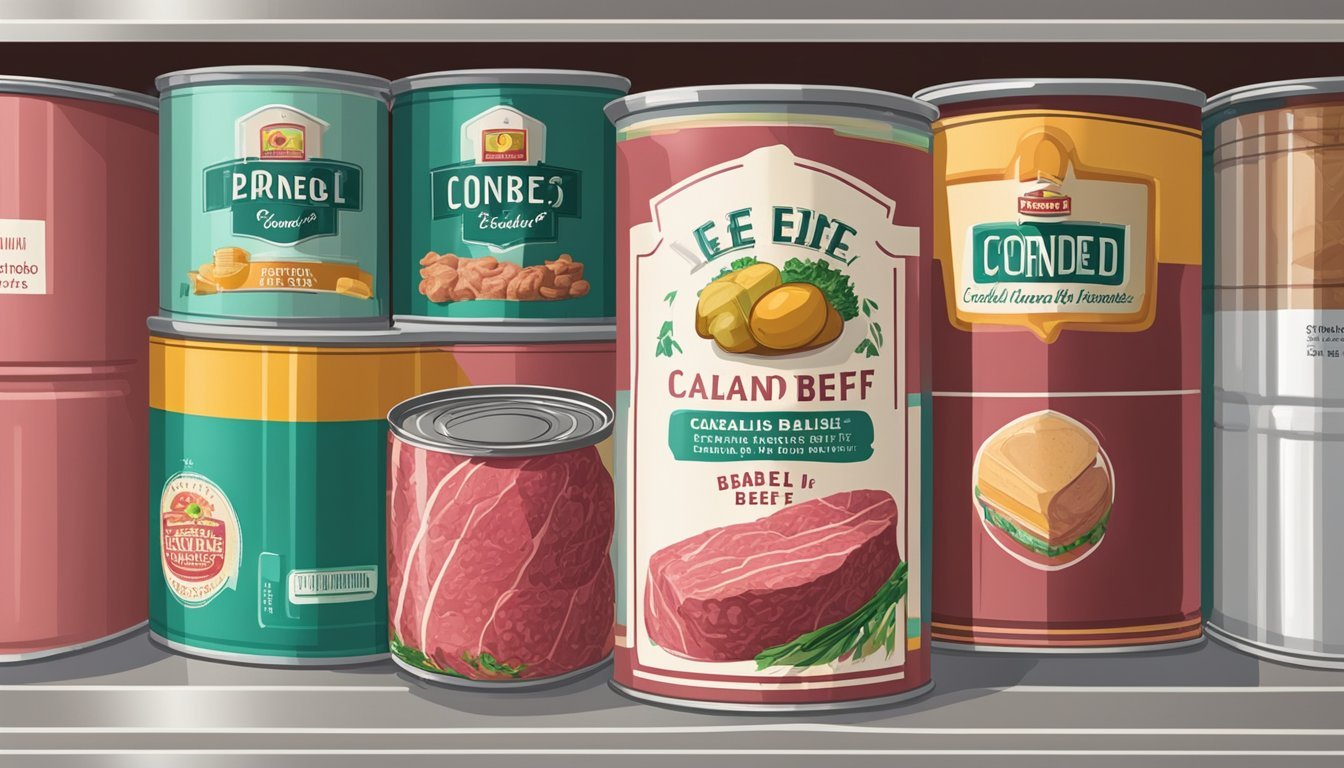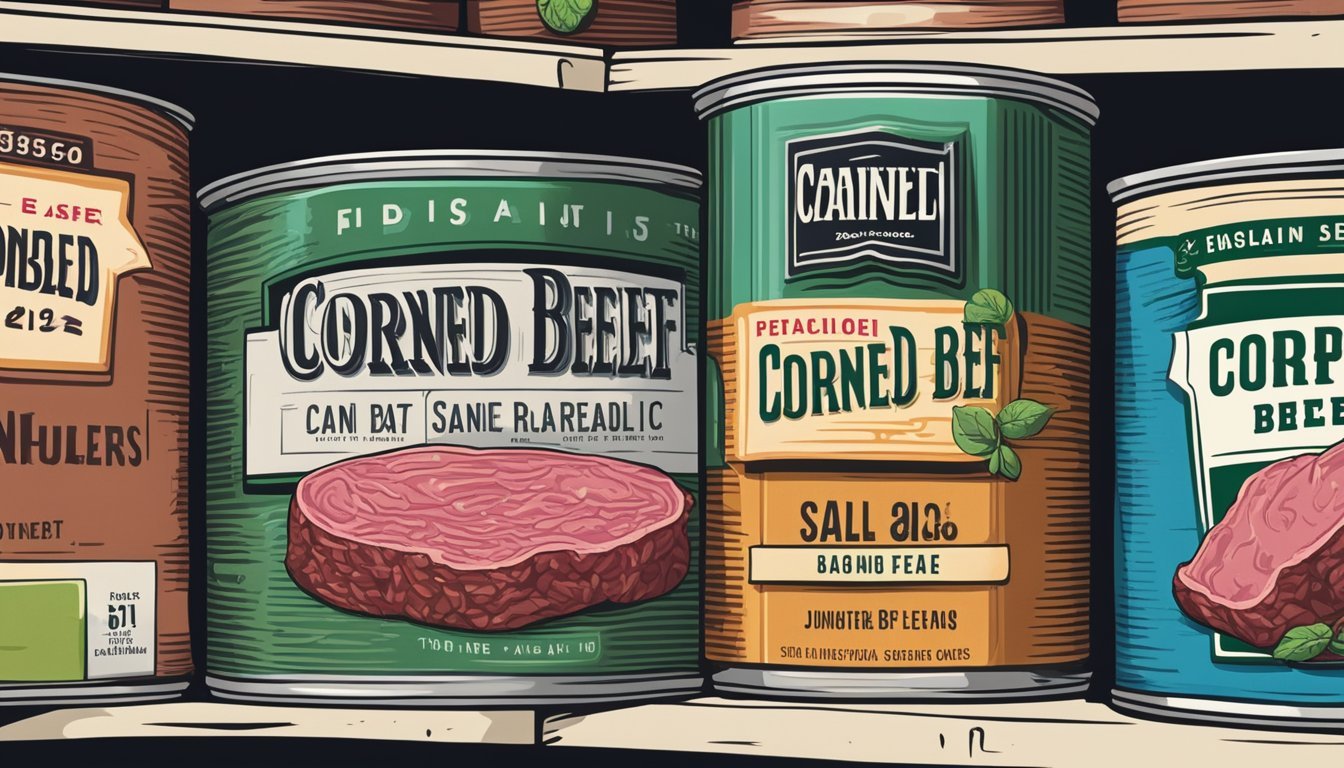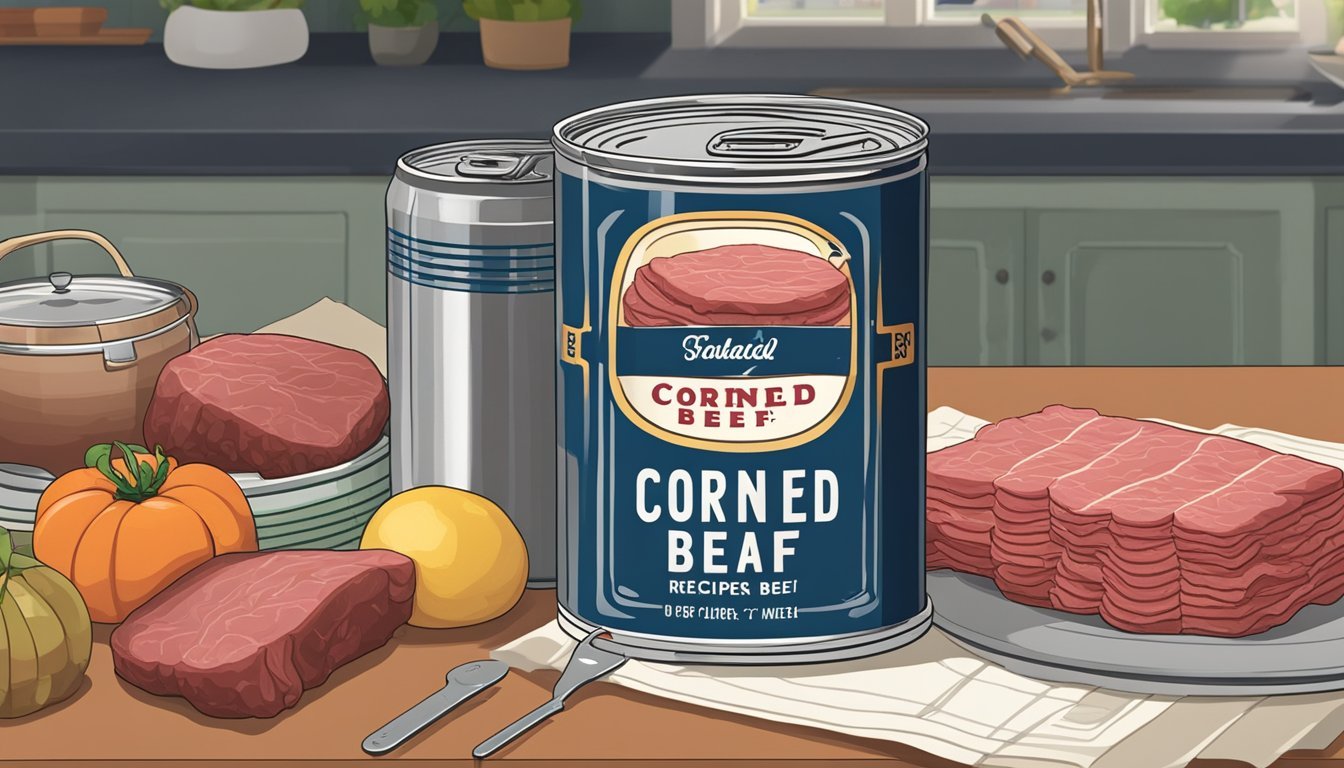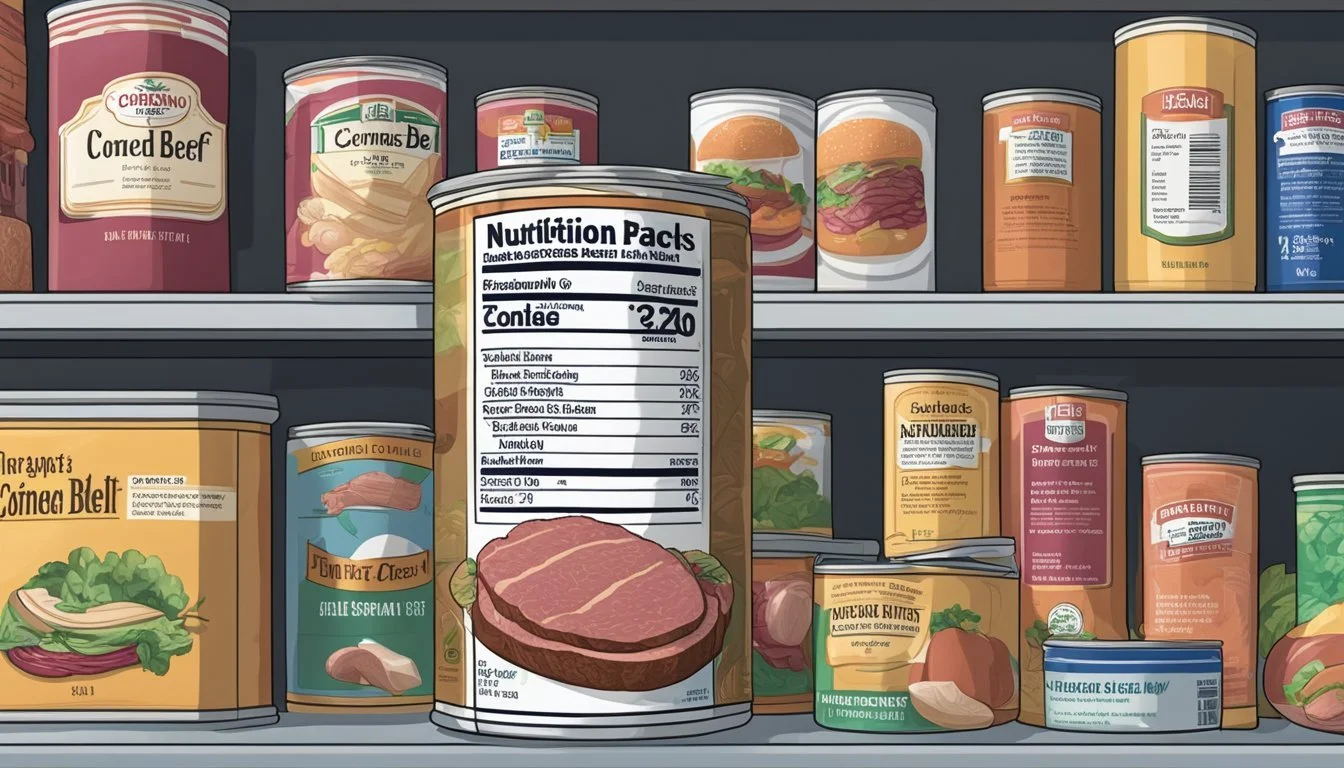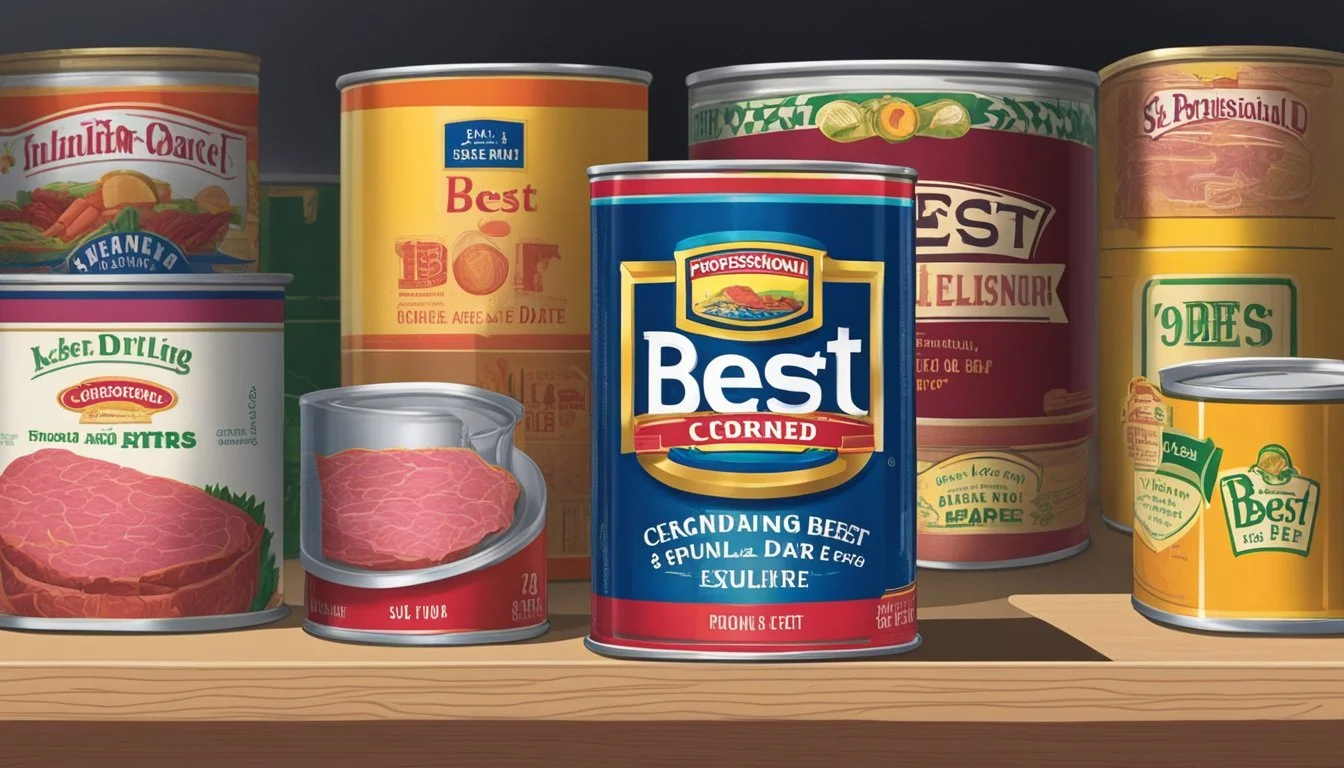How Long Does Canned Corned Beef Last?
Unveiling Shelf Life and Storage Tips
Canned corned beef (What wine goes well with beef?) is a convenient option for those seeking a long-lasting meat product. Its origins trace back to ancient food preservation methods, adapting over centuries to become a modern pantry staple. The shelf life of unopened canned corned beef typically ranges from three to five years when stored under ideal conditions, which include a cool, dry place away from direct sunlight. This longevity is attributed to the canning process, which ensures that the beef remains edible and free from spoilage for an extended period.
Once opened, the shelf life of canned corned beef is significantly reduced. To maintain its quality and safety, opened canned corned beef should be consumed within five to seven days if stored properly in the refrigerator. The storage conditions after opening are vital to preventing bacterial growth and preserving the meat's taste and texture. Consumers can extend the usability of opened canned corned beef by ensuring it is kept in an airtight container and refrigerated promptly after use.
Understanding the shelf life of canned corned beef is crucial for both culinary purposes and food safety. While the high salt content characteristic of corned beef acts as a preservative, it cannot prevent eventual spoilage once the can's seal is broken. Consumers should always check for signs of spoilage, such as off odors, discoloration, or textural changes, before consumption, even when the product is within its estimated shelf life.
Understanding Canned Corned Beef
Canned corned beef is a convenient and long-lasting meat option, offering a way to enjoy this protein-rich food with the benefit of an extended shelf life. The preservation process not only ensures safety and convenience but also impacts the nutritional content of the meat.
Definition and Types
Canned corned beef refers to beef that has been salt-cured and cooked before being sealed in airtight containers for preservation. The types of canned corned beef can vary, ranging from chunky and minced versions to those with added flavors or seasonings. Corned beef is traditionally made from brisket, a cut of beef renowned for its flavor after being preserved in a seasoned brine.
Content and Nutritional Value
Canned corned beef is known for its high protein content, which is essential for muscle repair and overall body function. It is also a good source of iron, supporting oxygen transport throughout the body. However, it is notable for its fat and sodium levels, which can be significant, hence it should be consumed in moderation. Below is a brief nutritional profile of a typical serving of canned corned beef:
Nutrient Amount per 100g serving Protein 24g Iron 2.8mg Fat 14g Sodium 1,000mg
These values can vary between different brands and types of canned meat. Due to the preservation process, canned corned beef may have a higher sodium content compared to its fresh counterpart, so it's important for consumers to consider this as part of their dietary intake.
Shelf Life of Canned Corned Beef
The longevity of canned corned beef depends largely on whether the can remains unopened or has been opened. Maintaining the integrity of the can's seal and storage conditions affect shelf life and quality.
Unopened Shelf Life
When kept in a cool, dry area, an unopened can of corned beef preserves its quality for 3 to 5 years. The expiration date labelled by the manufacturer acts as a guide to ensure best quality, but canned corned beef can remain safe to consume beyond this time frame if the can's integrity is uncompromised and storage conditions have been optimal.
Opened Shelf Life
Once opened, canned corned beef should be transferred to an airtight container if not used entirely. It can then be stored in the refrigerator, where it will retain its quality for 5 to 7 days. To extend the shelf life further, opened corned beef can be frozen, where it can last for about 2 to 3 months.
Optimal Storage Conditions
Proper storage is essential for preserving the quality and safety of canned corned beef. Attention to temperature and moisture levels is key, ensuring the product remains in the best condition for as long as possible.
Storing Unopened Cans
For unopened canned corned beef, a cool, dry place is ideal. The location should remain consistently at a temperature below 85°F (29°C) and be away from direct sunlight which can cause temperatures to fluctuate, impacting the food quality inside the can. A pantry or cupboard often provides the optimal conditions for this purpose.
Temperature: Keep at a steady temperature below 85°F.
Moisture: Avoid areas where dampness or high humidity might corrode the can.
Storing Opened Canned Corned Beef
Once the can is opened, canned corned beef should be refrigerated within two hours. Transfer the meat into an airtight container to prevent contamination and drying out. The refrigerated temperature should ideally be set at 40°F (4°C) or below which inhibits bacterial growth.
Temperature: Store in the refrigerator at 40°F or below.
Moisture: Keep in an airtight container to maintain quality and prevent additional moisture from spoiling the product.
Signs of Spoilage and Food Safety
It's vital to know how to identify when canned corned beef is no longer safe to consume. Being able to recognize signs of spoilage can prevent foodborne illnesses. Proper storage practices and understanding spoilage indicators are key safeguards.
Visual and Olfactory Indicators
Color Changes: Fresh canned corned beef typically has a pink to reddish color. Discoloration, such as a dull color shift or gray spots, may indicate spoilage.
Unpleasant Odor: An off-smelling aroma is a clear sign that canned corned beef may be unsafe to eat. The smell can range from sour to putrid.
Texture: Fresh canned corned beef should have a consistent, firm texture. If it feels slimy or sticky, this is a warning of potential spoilage.
Mold Formation: Any visible mold growth inside or outside the can is a definite sign that the corned beef has spoiled and should not be consumed.
Health Risks and Precautions
Bacteria: Spoiled canned corned beef can harbor bacteria such as Salmonella, E. coli, and Listeria, which can lead to food poisoning.
Foodborne Illness: Consumption of spoiled corned beef may result in symptoms like nausea, vomiting, and diarrhea, indicative of foodborne illness.
Safety: Always inspect cans before use for any signs of damage, bulging, or leaks, which can introduce bacteria to the contents.
Caution: Even in the absence of visible spoilage signs, if there's any doubt about the safety of the canned corned beef, it's best to err on the side of caution and discard the product.
Using Canned Corned Beef in Recipes
Canned corned beef offers a convenient and flavorful protein source that can be integrated into a variety of dishes. When used in recipes, it provides a savory taste and a tender yet firm texture that can be retained or modified through different preparation techniques.
Preparation Techniques
Shredding the beef allows it to blend seamlessly into dishes like tacos and salads, whereas slicing it can be ideal for sandwiches. For a finer texture, one might mash the corned beef, particularly useful when combining it with other ingredients for fillings or spreads.
Shred: to incorporate into salads or tacos
Slice: ideal for sandwiches
Mash: suitable for fillings or spreads
Recipe Suggestions
When it comes to recipes, canned corned beef is highly versatile. Corned beef hash is a traditional breakfast when fried with potatoes and onions; it can be a hearty start to the day. Stews benefit from its rich flavor, especially when paired with root vegetables. Corned beef and cabbage is another classic dish, loved for its simplicity and comfort food feel. For a creative spin, it can be integrated into casseroles or used as a sandwich filling, offering a satisfying meal with minimal preparation time.
Breakfast: Corned beef hash
Dinner: Stews, Corned beef and cabbage, Casseroles
Anytime: Sandwich filling
Serving and Pairings
A can of corned beef can go a long way in terms of servings, especially when paired with the right components. The meat's richness allows it to accompany light sides like pickles which provide a tart contrast. Serving it alongside or topped with mustard can enhance its natural flavors. In terms of pairing, corned beef works well within sandwiches with rye or sourdough bread and is famously enjoyed in a Reuben sandwich.
Serve with pickles or mustard
Pair with rye or sourdough bread for sandwiches
Preservation Beyond Shelf Life
Canned corned beef can retain its quality well past its expiry date when stored under the right conditions. To extend its usability even further, one can employ freezing as an effective method of preservation.
Freezing and Thawing Process
Freezing:
Storage: To freeze canned corned beef, it should first be removed from the can and transferred to an airtight container or a heavy-duty freezer bag to prevent freezer burn and preserve peak quality.
Liquid: Adding a small amount of liquid, such as the broth from the can, can help maintain moisture and protect the meat's texture during freezing.
Duration: In the freezer, corned beef can maintain its quality for 2-3 months.
Thawing:
Refrigeration: Always thaw frozen corned beef in the refrigerator to ensure safety and prevent the growth of harmful bacteria.
Consistency: Once thawed, the corned beef should be consumed within 3-4 days and should not be refrozen, as the process can alter its texture and overall quality.
Nutritional Considerations and Diet
When discussing canned corned beef, understanding its nutritional content is essential for integrating it into a balanced diet.
Corned Beef in a Balanced Diet
Canned corned beef is rich in protein and contains iron, which are both vital for maintaining good health. However, it also comes with a high amount of sodium and fat, which should be consumed in moderation.
Protein: Canned corned beef is a good source of protein, which is crucial for muscle repair and growth.
Iron: The iron found in corned beef aids in preventing anemia and supports oxygen transportation in the body.
Sodium: High levels of sodium can lead to increased blood pressure and cardiovascular risks. Individuals should manage their intake appropriately.
Fat: While providing energy, the saturated fats in corned beef should be considered within the context of one's total daily fat intake.
Incorporating canned corned beef into a balanced diet requires careful consideration of these nutritional metrics. It's recommended that individuals pair it with foods low in sodium and saturated fats, and high in fiber, such as fresh vegetables and whole grains, to maintain nutritional balance.
Practical Tips for Handling and Usage
When handling canned corned beef, it is essential to understand the importance of proper storage and usage to maintain quality and ensure food safety. The reader should pay close attention to the container and packaging upon opening and take measures to extend the shelf life of the product.
Container and Packaging
After opening canned corned beef, one should immediately transfer any leftovers to an airtight container or cover them tightly with plastic wrap. This helps minimize exposure to air and moisture, which can compromise the quality and safety of the meat.
Transfer guidelines:
Remove leftover corned beef from the can.
Place in an airtight container or wrap securely in plastic.
Shelf Life Extension
The longevity of canned corned beef is contingent on appropriate storage conditions. Keep opened corned beef refrigerated at temperatures below 40°F (4°C) to prevent the growth of bacteria. Unopened cans should be stored in a cool, dry place away from direct sunlight and high temperatures, which can affect the quality of the can and the meat inside.
Refrigeration recommendations:
Refrigerate opened corned beef within two hours of opening.
Consume within 5-7 days to ensure peak quality and safety.
Frequently Asked Questions
In this section, readers will learn about the storage and consumption of canned corned beef to maximize shelf life and maintain quality.
Common Concerns about Canned Corned Beef
Shelf Life: Unopened canned corned beef typically retains its best quality for 3 to 5 years when stored in a cool, dry area. After this period, the color and texture of the beef brisket (What wine goes well with beef brisket?) may change, although it may still be safe to consume if stored properly and the can is not damaged.
Quality: If unopened, canned corned beef maintains its quality as long as it is kept at a stable, cool temperature.
Expiration Date: Always check the expiration date on the can as a first indicator of its current quality.
Color and Liquid: A change in the color of the beef or the clarity of the liquid inside the can may indicate spoilage.
Best Practices for Consumption
Storage: Refrigerate canned corned beef after opening, where it should remain of good quality for 3 to 4 days. Ensure it is covered or stored in an airtight container.
Temperature: Keep the leftover chilled, ideally at a temperature below 40°F (4°C).
Consumption: One should consume the beef brisket within the mentioned time frame to enjoy its optimal taste and texture.
Freezing: To extend the shelf life beyond refrigeration, freeze the canned corn beef in a freezer bag or airtight container for 2 to 3 months.

